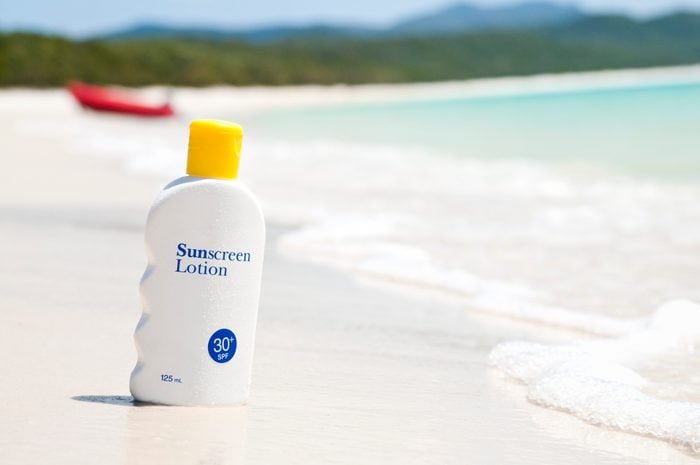
Wearing sunscreen every day
According to the Government of Canada, skin cancer is one of the most common types of cancer in Canada, counting for about one third of all new cases of cancer. Basal cell carcinoma (BCC) and squamous cell carcinoma (SCC) are the two most common types of skin cancer; while melanoma, which is rarer, is considered to be a much more aggressive and dangerous form of skin cancer.
The good news: Regular daily use of an SPF 15 or higher reduces the risk of developing BCC and SCC by about 40 percent, and reduces the risk of developing melanoma by 50 percent, according to the Skin Cancer Foundation.
“Sunscreen reduces your overall UV [ultraviolet] exposure and lowers your risk of skin cancer and sun damage,” says Hadley King, MD, board-certified dermatologist in New York City and clinical instructor of dermatology at Weill Cornell Medicine. With regular use, sunscreen can help reduce your risk of developing skin cancer and also prevent premature skin aging caused by the sun—think: Wrinkles, sagging, and discoloration or age spots, Dr. Hadley explains.
It’s especially important on your face. Your face is one of the areas of the body that gets the highest amount of sun exposure, says Haley Goldbach, MD, California-based board-certified dermatologist. “That means it’s prone to both skin cancer and aging,” she says.
Your face gets a lot of “sneaky sun exposure” throughout the day, meaning, it’s getting hit by UV rays even if you don’t notice it, Dr. Goldbach says. “Walking to the store, driving, even taking out the trash. It all adds up. And don’t be fooled by clouds or colder weather—UV radiation still hits the skin.”
While most dermatologists suggest wearing wide-brimmed hats and seeking shade as much as possible when you’re spending time outside, that doesn’t really help in everyday life. You’re not going to wear a big beach hat on your commute to work. What you can easily do is apply face sunscreen every morning before you leave the house.
Buy a sunscreen with at least SPF 30
Dermatologists recommend using sunscreen with at least SPF 30. “A sunscreen’s SPF, or sun protection factor, measures how much the product shields shorter-wave ultraviolet B rays, known as UVB radiation, which can cause sunburn,” Dr. King explains. Sunscreens with SPFs that are higher only offer marginally better protection from a sunburn than SPF 30; for example, SPF 100 blocks 99 percent of UVB rays, while SPF 50 blocks 98 percent and SPF 30 blocks 96.7 percent, Dr. King says. “I therefore generally recommend using a sunblock that has SPF 30 or higher.”
Read the sunscreen labels
You also want to look for sunscreen labelled “broad-spectrum.” This means it protects against both UVB [ultraviolet B] and UVA [ultraviolet A] rays, which are both responsible for causing skin damage that can lead to skin cancer and aging.
Facial skin is often more sensitive than skin on the rest of the body, Dr. King notes, meaning that it’s more likely to break out or become red and irritated from products. To reduce the risk of breakouts, look for products labelled “non-comedogenic” or “oil-free.” If you have sensitive skin, avoid any added fragrances or “parfum,” suggests Dr. Goldbach, as these ingredients can potentially cause an allergic reaction.
Physical (or mineral) sunscreens
More and more, dermatologists suggest choosing a physical (or mineral) sunscreen over chemical sunscreen if you can. That means the active ingredients should be zinc oxide and/or titanium dioxide. Physical sunscreens sit on the top of the skin and block UV rays, whereas chemical sunscreens absorb into the skin and absorb UV rays before they can do damage, the Skin Cancer Foundation explains. A 2019 study published in JAMA found that common chemical sunscreen ingredients are absorbed into the bloodstream. This has led experts to question the safety of chemical sunscreens, though more research needs to be done to determine if the typical amount we use is enough to cause adverse effects. In the meantime, many dermatologists suggest opting for physical when you can—though any sunscreen is always better than none, Dr. Goldbach notes.
Physical sunscreens may also be kinder to your skin. “Physical sunscreens are less likely to clog pores and irritate complexions, particularly for those with sensitive skin,” says Dr. King. That’s because these active ingredients are non-comedogenic and also tend to be a bit drying. (Keep in mind, though, that facial sunscreens may contain other ingredients that can cause breakouts, Dr. King adds.) As a bonus, zinc oxide and titanium dioxide are also safer for the oceans and coral reefs, Dr. Goldbach says.
Zinc oxide and titanium dioxide used to be known for being thick, chalky, hard to spread, and very white. But in recent years, skin-care brands have made leaps and bounds in product formulation. “So many companies have developed products that are incredibly sheer and won’t leave a white residue,” says Dr. Goldbach.
Below, with the help of Dr. Goldbach and Dr. King, we’ve rounded up 10 great face sunscreen options that you won’t mind wearing every day. Bonus: Some of them can double as a tinted moisturizer, making your morning routine even simpler. (See, applying sunscreen doesn’t always mean more work!)
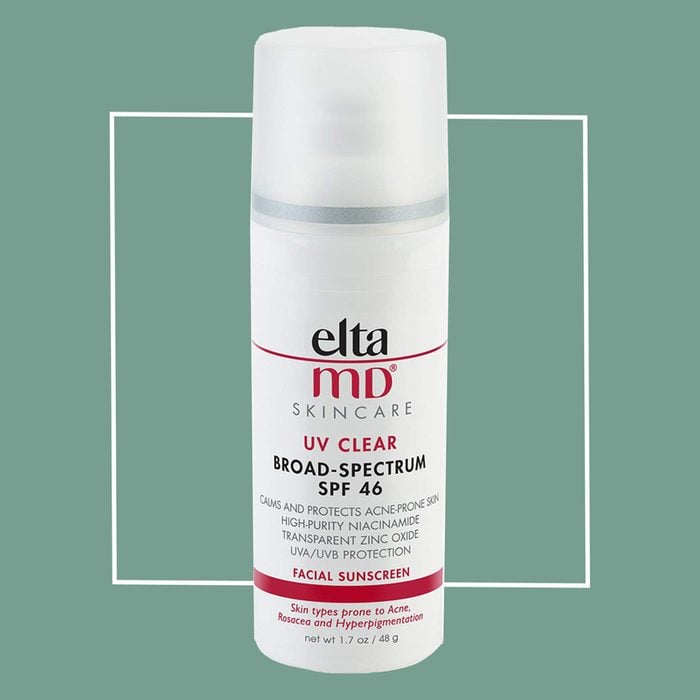
EltaMD UV Physical Tinted Face Sunscreen SPF 46
EltaMD is a brand that comes highly recommended by dermatologists. This particular face sunscreen is oil-free, fragrance-free, and safe for all types of skin including acne-prone, extra-sensitive, and post-procedure skin. It’s formulated with transparent zinc oxide, plus, contains a light tint. Dr. Goldbach says she just recently finished up a tube of this and vouches that it’s really easy to apply.
EltaMD UV Physical Tinted Face Sunscreen SPF 46, $52, walmart.ca
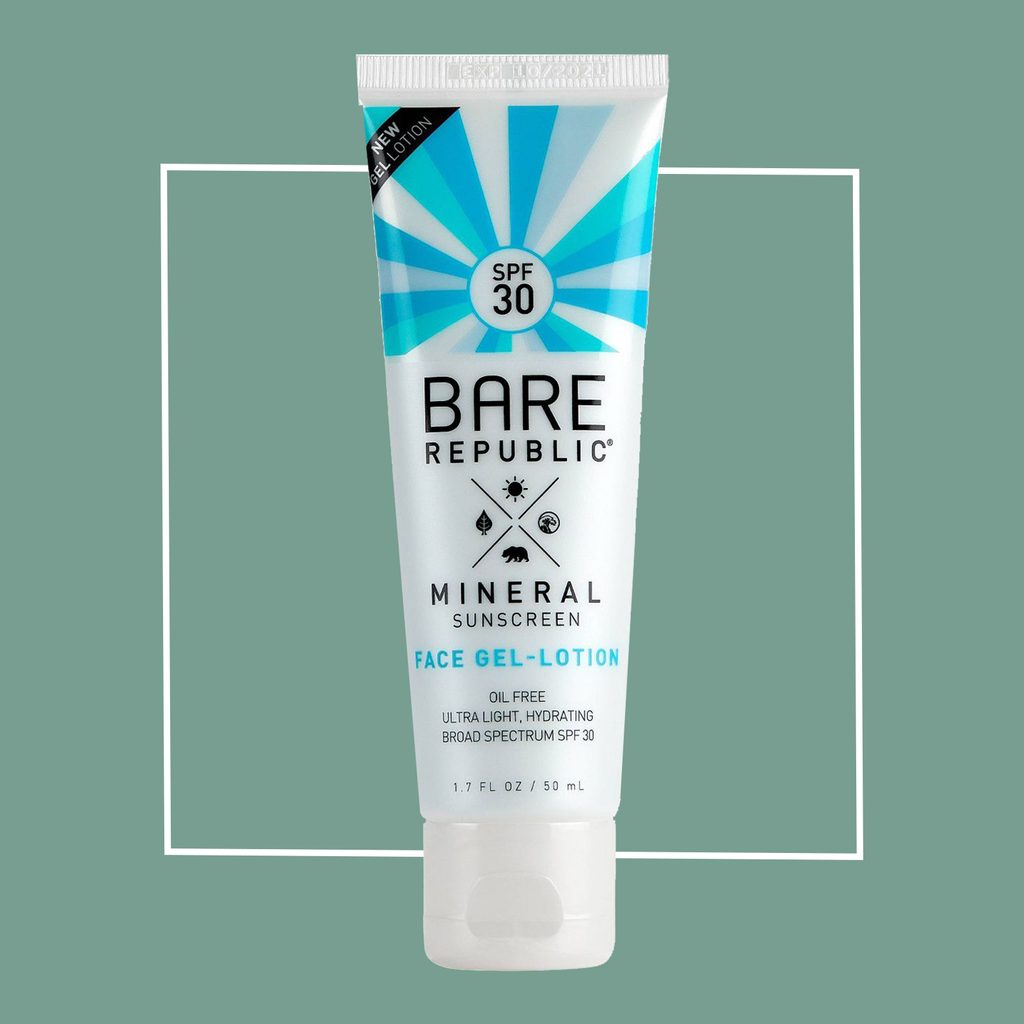
Bare Republic Mineral Face Gel Sunscreen Lotion SPF 30
Gel lotion is just as cool as it sounds. This sunscreen is super light and glides onto skin seamlessly. It dries quickly and doesn’t leave a noticeable white cast on most skin tones. It’s unscented, non-comedogenic, and contains other ingredients to soothe and moisturize skin, like cucumber and aloe extracts.
Bare Republic Mineral Face Gel Sunscreen Lotion SPF 30, $20, well.ca
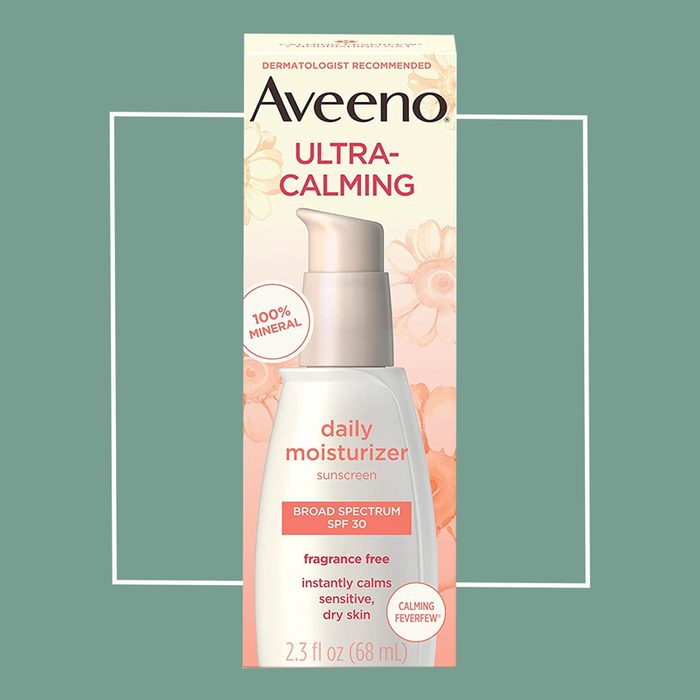
Aveno Ultra Calming Daily Moisturizer SPF 30
This daily moisturizer contains physical sunscreen ingredients, making it a great two-in-one option for anyone looking to hydrate and protect skin with one single product. Not only is it void of any ingredients that irritate sensitive skin and exacerbate acne or redness, it actually contains ingredients specifically to help calm skin down. It’s a little thicker than some of the other sunscreens on this list, so best for dry skin that thrives with extra-hydrating creams.
Aveno Ultra Calming Daily Moisturizer SPF 30, $26, shoppersdrugmart.ca
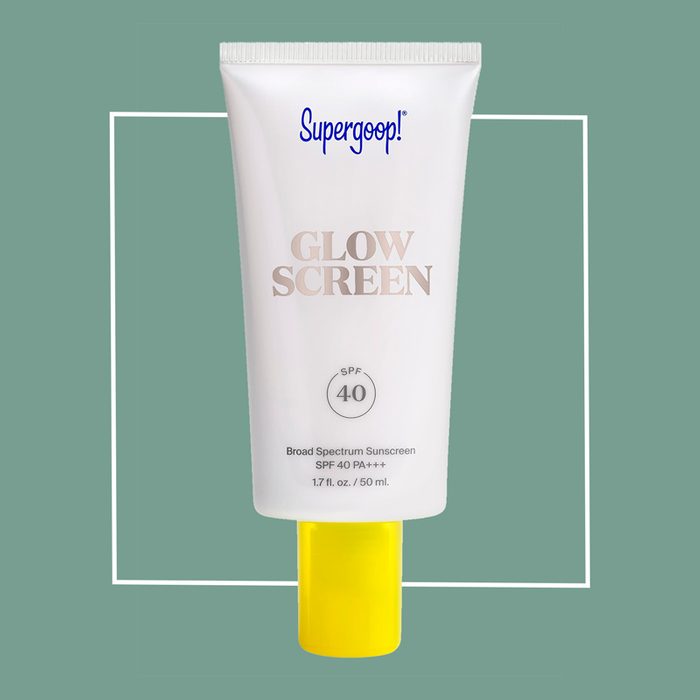
Supergoop! Unseen Suncreen SPF 40
This facial sunscreen is a mix between sun protection and primer. It hydrates the skin while prepping it for makeup—but you can wear it on its own, too. This sunscreen does contain chemical sunblockers, but as doctors note, finding a product you really love and will wear every day is the most important.
Supergoop! Unseen Suncreen SPF 40, $45, sephora.com
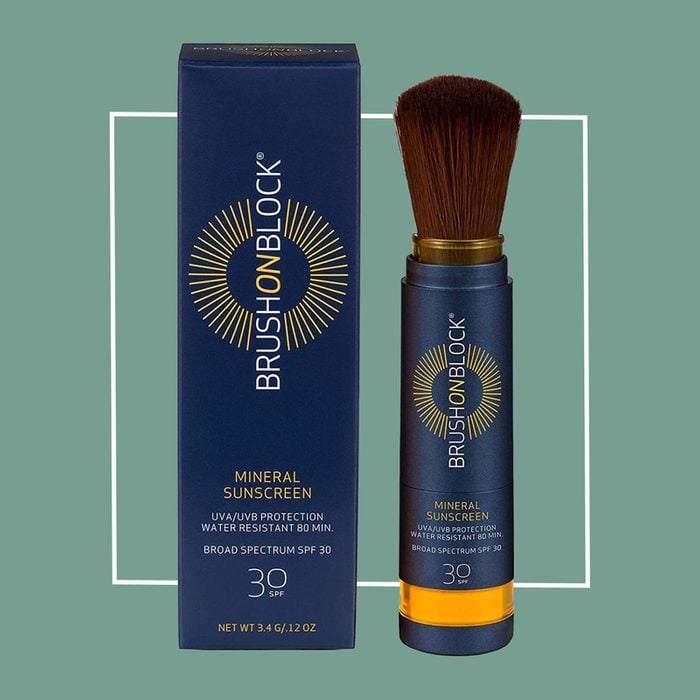
Brush On Block Mineral Sunscreen Powder SPF 30
This brush-on sunscreen powder is sheer, light, and comes in a self-dispensing brush that makes it simple to apply. Dr. King notes that this one’s particularly great for reapplying throughout the day. “It’s a great solution for people who don’t want to reapply sunscreen because they don’t want to mess up their makeup.” It also functions like a finishing powder, absorbing excess oil and extending the life of your makeup. Pro tip: Apply to the part in your hair to protect your scalp. (Here are the other body parts that need SPF too.)
Brush On Block Mineral Sunscreen Powder SPF 30, $38, walmart.ca
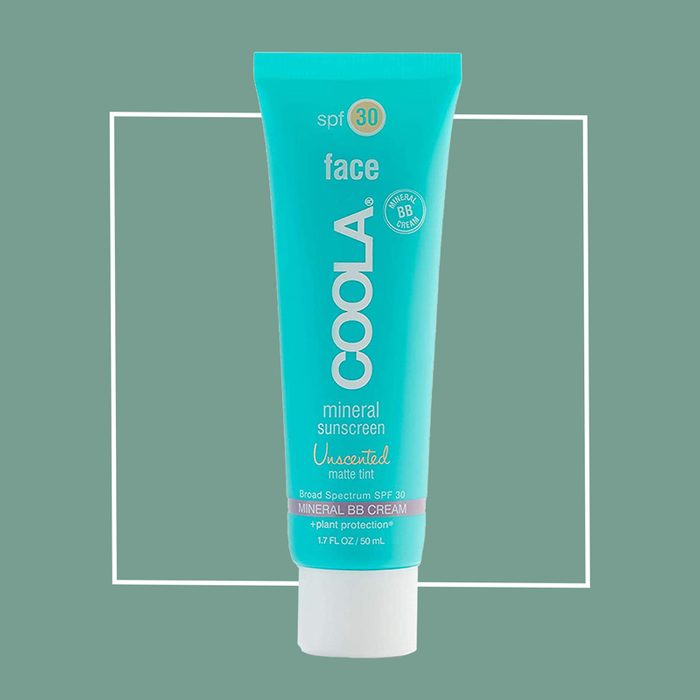
Coola Organic Mineral Face Matte Tint Sunscreen, SPF 30
Another great tinted option, this mineral sunscreen has a smooth, almost velvety feel and leaves skin with a matte finish. Because of this, it also works as a great primer to apply under whatever face makeup you want to put on for the day. It also contains hydrating ingredients like shea butter and various oils (which may be too heavy for some with acne-prone skin).
Coola Organic Mineral Face Matte Tint Sunscreen, SPF 30, $48, sephora.com
Next, learn about the most important skin-care product, after sunscreen.
